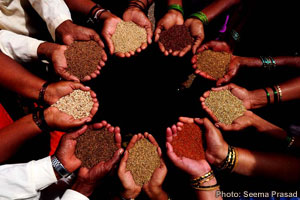Throughout the world, small-scale farmers face different challenges when building a market for their products. Different strategies, involving different stakeholders, are proving to be beneficial, contributing to the generation of more sustainable livelihoods.
Zimbabwe: Organic certification

A certification process normally involves a third party and the high costs involved are a big barrier for small-scale farmers. As such, ZOPPA has designed a local compliance system modelled on a participatory guarantee system (PGS): stakeholders inspect each other and ZOPPA verifies the process before awarding the ZIM Organic label.
ZOPPA is now also developing a label for natural products, which although not strictly organic, are produced without external inputs. This is intended to help more farmers to benefit from a growing demand for natural products. It will stimulate more farmers to stop using pesticides, and will create a “near-organic” food supply that is affordable for all sectors of the population. ZOPPA is mostly focused on national and local markets: they raise awareness among consumers about the advantages of the ZIM organic label and try to strengthen the linkages between small-scale producers and local institutions, such as hospitals, schools and hotels.
For more information contact Fortunate Hofisi Nyakanda at ZOPPA.
E-mail: fortunate@zoppa.org.zw
India: A local chain

Since 2010 it runs the Sahaja Samrudha Organic Producers Company Ltd., helping farmers exhibit and sell their products, and thus supporting their conservation efforts. Products are purchased in bulk, procured directly from more than 750 certified organic farmers, and also from more than 1,000 farmers in transition to an organic system.
Working in partnership with other organisations and farmer groups, with organic fairs and bazaars, these products go to a total of 26 “network outlets” in the major cities of southern India on a regular basis, reaching urban consumers directly. Sahaja Organics markets a wide range of traditional products, including thirty different varieties of rice, fifteen varieties of millets, as well as wheat, pulses, fruits and vegetables, herbal products and processed foods. As well as buying and selling organic products, the company is helping to develop a strong network of producers and consumers.
For more information contact Seema Prasad at Sahaja Samrudha or visit their website: www.sahajasamrudha.org.
E-mail: sahajaindia@gmail.com ; seemaprasadg@gmail.com
Tanzania: Collective action
In 2009, the Aga Khan Foundation started a 5-year long project to enhance food security in the regions of Mtwara and Lindi, in southern Tanzania. Fully aware of the potential benefits of the System of Rice Intensification (SRI), it started working with the government’s extension officers to form SRI producer groups. Four years later, more than 15,000 farmers have adopted SRI, including 3,700 farmers who, because of time constraints, never attended a training session. The results have been very encouraging. However, as average yields doubled or even tripled, storage became a new limitation.
In 2012, the first 13 producer and marketing groups began to store rice, helping farmers to sell their produce when the prices are higher. Collective action also helps them to bulk their surpluses, reduce their post-harvest losses, and improve their marketing opportunities. This has also led to the formation of different savings groups, helping farmers connect to those who provide financial services and inputs.
Working together with the Financial Sector Deepening Trust, thousands of families are now meeting their household needs and investing in their production systems. By boosting productivity and supporting its commercialisation, rice has shifted from being a subsistence crop to becoming a cash crop.
For more information contact Mike Bowles or Sam Pickens at the Aga Khan Foundation.
E-mail: sam.pickens@akdn.org
Sri Lanka: Information for stronger organisations
Photo: S. SrikrishnahDairy farming is an important livelihood option in Sri Lanka, contributing substantially to food security. Farmers, however, face many difficulties in marketing the milk they produce, relying on middlemen who pay low prices.
The Ministry of Livestock Development has helped set up many different “Farmer Managed Societies” (FMS) to help farmers to deliver their milk directly to a subsidiary company under the purview of the Ministry, thereby ensuring higher profits.
Farmers are encouraged to organise their own FMS to help themselves in their marketing efforts, and to join the groups already established throughout the country, of which there are more than 2,000. The Lifelong Learning Farmers programme is playing a key role in eastern Sri Lanka, fostering strong linkages between “knowledge providers” and farming communities, helping the latter to develop technical and organisational skills.
Under this programme, the Eastern University of Sri Lanka has been organising a series of workshops and providing technical assistance, focusing on issues that range from pasture conservation to improved milk quality, as the price of milk is based on its quality. This is not only leading to more FMSs being formed, but also to groups that are better able to benefit from the marketing options being developed.
For more information contact Thayamini H. Seran or Thivahary Geretharan at the Faculty of Agriculture, Eastern University of Sri Lanka.
E-mail: thayaseran@yahoo.com

